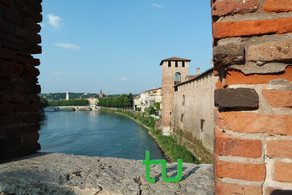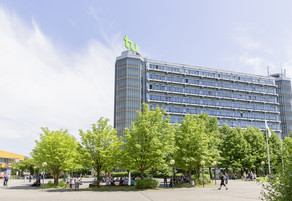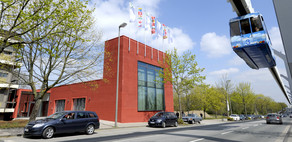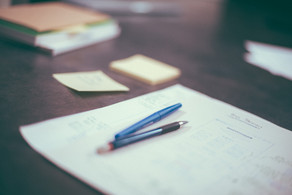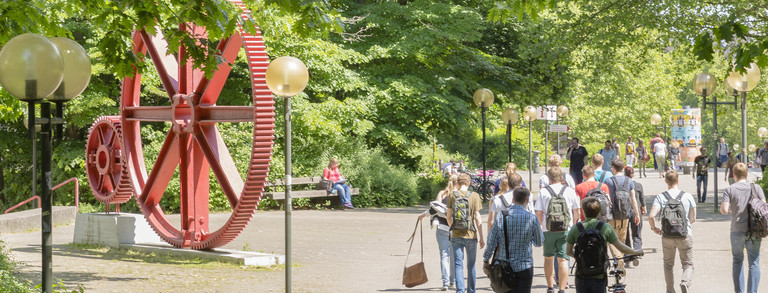Language Training for Refugees
German is the language of instruction for the majority of degree programs at TU Dortmund University. Therefore you need to have a very good knowledge of German to take up a degree program, which must be proven by passing a recognized German language examination. The only exceptions to this rule are the English-language degree programs, for which a corresponding proof of English is required.
Language learning financed by support program "NRWege ins Studium"
Since January 2017, TU Dortmund University has been supporting refugees who are interested in studying with language preparation for studies at TU Dortmund University. This is made possible by the support program "NRWege ins Studium", which is funded by the Ministry of Culture and Science (MKW) of the state of North Rhine-Westphalia and applied for at the Counseling Services for Refugees under the title Language Training for Refugees.

The Language Training for Refugees includes participation in preparatory German courses at levels B1 - C1, taking the DSH examination, and a supporting framework program.
Online-Formular
Applications are currently closed. The next application period begins on July 15.
FAQs
The language of instruction for the majority of the degree programs is German. In addition, some Master's degree programs are also offered in English. On the following website, you can find a list of all degree programs with an overview of whether they are offered as Bachelor's and/or Master's degree programs and in which language the respective degree program is taught.
Detailed information on language requirements or an overview of recognized language certificates can be found on the website of the Admissions and Enrollment Office.
No, this is not necessary. The Language Training serves to prepare you for your studies; therefore you do not have to be enrolled at TU Dortmund University and will not be enrolled at the university during your participation in the program.
Within the framework of this program, students are prepared for university studies by attending German courses. These courses have the aim to prepare for the DSH examination, the German language certificate Deutsche Sprachprüfung für den Hochschulzugang ausländischer Studienbewerber (DSH Level 2 or 3).
A certificate of passing the DSH examination level 2 or 3 is considered as a recognized proof of German (see question 2).
The program offers preparatory German courses for university studies at levels B1 - C1. These are intensive courses with a minimum duration of 24 hours per week. The German courses are in-person classes.
Important: Please note that you must take a placement test at one of the cooperating language schools as part of the application process. Should you be classified into the language levels A1 or A2 during the placement test, you will unfortunately not be able to qualify for the program. The result of the placement test is binding.
No, they do not. The preparatory German courses take place as in-person classes at cooperating language schools in the area of Dortmund city. The Refugee Counseling and Integration Office is responsible for assigning students to the respective language schools.
The framework program is an accompanying program designed to support the participants of the Language Training in their learning processes and in their integration into the German university context. Participation in the framework program is obligatory for the participants of the Language Training.
Currently, the framework program consists of regular visits to the German Language Café and participation in interdisciplinary workshops.
For participants of the Language Training, we cover the costs of the German language courses and the participation in the framework program. Likewise, after successful completion of the German courses, the costs for participation in the DSH examination will be covered once. The detailed contents and agreements of the program will be explained to you during the application process and recorded in writing after that.
The following evidence and confirmations must be provided as part of the application process:
- University entrance qualification (in original language and German or English translation).
If you are uncertain whether you have a general university entrance qualification which is valid in Germany, you can verify this via the following websites: Anabin, DAAD Zulassungsdatenbank.
- Acquisition of the higher education entry qualification abroad (no domestic students)
- Proof of a refugee background. Please submit your currently valid residence permit for this purpose (copies of front and back).
- Current residence in Dortmund or the surrounding area
- Motivation letter in German; alternatively in English if little knowledge of German is available.
- Proof of existing German language skills. Please submit a language certificate (at least A2 level or higher) that is not older than two years.
- Entry into Germany within the last five years. As part of the application process, you must be able to confirm that your entry into Germany dates back no longer than five years. If you entered Germany more than five years ago, you will unfortunately not be eligible for the Language Training.*
*Exceptions possible if individuals have already received support under NRWege ins Studium (scholarship, language course or consultation) or for the following reasons: Raising children, caring for care-dependent relatives, personal illness. Please contact us if this applies to you.
It is possible to apply within the application periods. The remaining application periods for the Language Training for refugees in 2025 are:
- 15.04. bis 30.04.2025 (course start expected in June/July/August 2025)
- 15.07. bis 31.07. 2025 (course start expected in October/November 2025)
Subject to change without notice.
The application runs exclusively via an online form. The link to the online application form will be published on this website at the beginning of each application period.
Please note that due to the large number of applications, there is no guarantee that you can get a place as participant in the program.
Do you have any questions about applying for a place in the language training? Then do not hesitate to contact the Refugee Counseling and Integration Office.




German Language Café
Would you like to practice and improve your German language skillsin a casual setting? Then join us in our German Language Café.
The website of the German Language Café offers you an overview of the upcoming meeting dates, the location details and further relevant information.
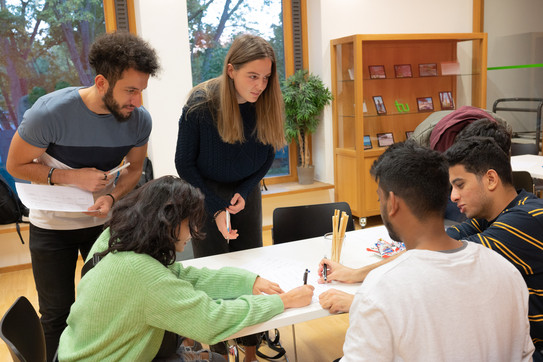
Further offers for learning German
For people who cannot participate in the Language Training for Refugees or for those who would like to improve their German in addition to the support program, there are further options:
- Private language schools in Dortmund and the surrounding area
- Volkshochschulkurse: Information about the VHS Dortmund can be found here (DE).
- Online language courses (advantage: can be attended flexibly from anywhere in the world)
- Goethe-Institut
- Information on language courses and continuing education for immigrants in Germany on the website of the Federal Office for Migration and Refugees, and
- Search engine for integration courses (language course and orientation course)
- Search engine for integration courses (language course and orientation course)
- Goethe-Institut: Further self-learning offers on the website as well as on the YouTube channel (DE)
- Federal Office for Migration and Refugees: The "Ankommen" app
- VHS learning portal
- Deutsche Welle:
- German broadcaster for foreign countries
- Offers resources for learning German (e.g. podcasts)
- Other YouTube channels, podcasts and media libraries of public broadcasters:
- ARD Mediathek: Information can be found here.
- alpha lernen
- WDRforyou
- Books:
- Children's books recommended for beginners
- Books from other countries, which you already know in your native language
- Movies and series (preferably with German subtitles)
- e.g. "Nicos Weg" from Deutsche Welle specifically for learning German
- Listening to music in German while reading the lyrics
- Language Café of the Refugee Counseling and Integration Office
- Tandem partnership, for example through the Center for Higher Education (zhb) at TU Dortmund University. More information about the Tandem method and the program at TU Dortmund University can be found here.
- App "Tandem"
- Groups in social networks (e.g. Facebook)
This overview of additional learning opportunities does not claim to be exhaustive.

![Eat & Read [Translate to English:]](/storages/international/r/Bilder/Veranstaltungen/Eat___Read/waffel_plain_buecherturm.jpg)



